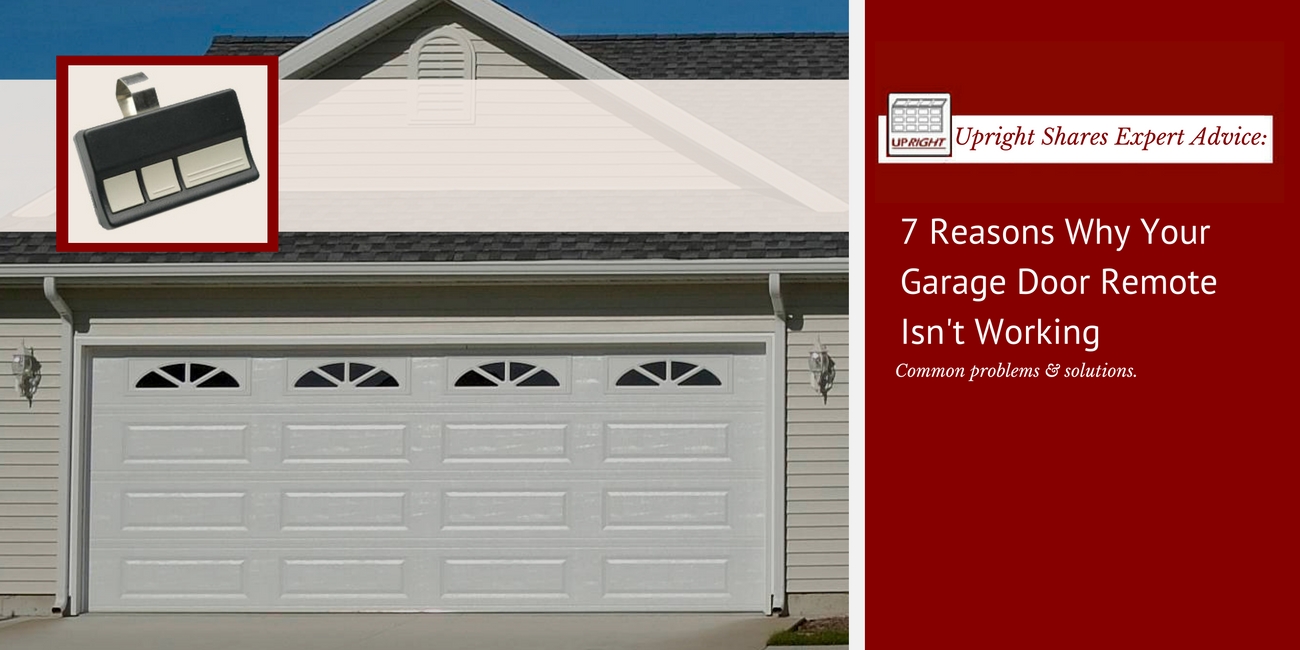Many people enjoy the safety, security, and convenience of garage door openers. Being able to control a garage door with just the touch of a button is such an everyday common occurrence, that most people don’t give it much thought. Until the garage remote won’t work.
If it the garage remote is not responding, resist the temptation to repeatedly push the remote button. The garage door opener should operate after one firm push of the remote button. If not, the first step is to refer to the owner’s manual, as there are several troubleshooting steps to take which may solve the problem before calling for service. Homeowners can find many of the owner’s manuals online.
Common causes for unresponsive garage remote include:
[dropcap color=”black” background=”yellow” style=”rectangle” size=”big”]1[/dropcap]
[custom_blockquote style=”yellow”]Problem: Remote is out of range.
Solution: There is no specified range for a garage door opener. Move closer to the unit and try again. [/custom_blockquote]
[dropcap color=”black” background=”yellow” style=”rectangle” size=”big”]2[/dropcap]
[custom_blockquote style=”yellow”]Problem: Wall control may be locked.
Solution: Some garage door openers have a locking feature on the interior wall control. When this lock is engaged, all garage remotes are disabled; a security feature that is helpful when homeowners are away for an extended time. First, take a moment to ensure the lock hasn’t been accidentally engaged before making the call to a service technician, to save you the expense of a service call. [/custom_blockquote]
[dropcap color=”black” background=”yellow” style=”rectangle” size=”big”]3[/dropcap]
[custom_blockquote style=”yellow”]Problem: Weak batteries or corrosion on battery terminals.
Solution: Test and replace batteries with name-brand, quality batteries. Re-chargeable batteries are not recommended. Inspect battery terminals looking for wear, dirt or wetness, which are all potential factors in inhibiting the electrical current of the batteries to the circuit board inside the remote control. Contacts can be cleaned with fine-tooth sandpaper or fine steel wool. [/custom_blockquote]
[dropcap color=”black” background=”yellow” style=”rectangle” size=”big”]4[/dropcap]
[custom_blockquote style=”yellow”]Problem: Radio Frequency Interference – Due to regulations, garage door opener radios have limited power and limited range, therefore, their receiver’s can only respond to one signal at a time. When the opener receiver registers the signal from the garage remote control’s transmitter, it activates a relay, and the motor starts running. However, if nearby devices transmit signals that are on or near the same frequencies as the garage door opener remote, it will cause interference with the opener. If you find that you have to move closer and closer to the garage door with the remote for it to work, it is a good indicator of an interference problem.
Because garage door openers have limited power and range, and can be susceptible to interference, there can be many sources including (but not limited to):
[checklist style=”black”]
- cell phone towers
- nearby airports
- television and radio transmission towers
- wireless doorbells
- computers
- cordless power tool chargers
- sprinkler controls
- alarm systems
- small appliances i.e. clock radios
- WiFi/wireless networks
- appliances within 10′-15′ feet of receiver – whether plugged in or not
- fax machines and copiers
- thermostats – air conditioning or heating
- florescent and halogen lighting fixtures
[/checklist]
Solution: If you suspect RFI is the culprit, you will have to locate the source and find a solution. This may require you to:
[checklist style=”black”]
- Turn off devices one by one, in and around your home that you suspect may be the cause.
- Relocate the interfering device to a place farther from the garage door opener.
- Unplug it permanently, if it’s an interfering device you can live without.
- Have a diplomatic conversation and troubleshoot with your neighbour if their device is causing interference (it happens).
- Switch to a higher quality remote – it may help to cut some of the interference, as they work from a narrower band.
- Purchase filters which can reduce or eliminate RFI that comes from power and telephone lines.
- Switch to newer technology from the major manufacturers. These radio sets can receive and transmit on 2-3 different frequencies at the same time, which can reduce chance of RFI.
[/checklist]
[/custom_blockquote]
[dropcap color=”black” background=”yellow” style=”rectangle” size=”big”]5[/dropcap]
[custom_blockquote style=”yellow”]Problem: Garage remote requires reprogramming.
Solution: Reprogram remote – check owner’s manual or contact Upright Door Service Inc. for assistance. [/custom_blockquote]
[dropcap color=”black” background=”yellow” style=”rectangle” size=”big”]6[/dropcap]
[custom_blockquote style=”yellow”]Problem: Issues with Safety Reversing Sensors/Photo Eyes. If the garage door won’t close using the remote, but it will close when you hold down the button on the wall control inside the garage, this is a good indication that the problem lies with the safety eyes. For more information about safety reversing sensors, click here.
Solution: Clean dirty sensors with dry rags and test remote again. Check for misalignment of sensors, obstructions, and if the wire is still attached. [/custom_blockquote]
[dropcap color=”black” background=”yellow” style=”rectangle” size=”big”]7[/dropcap]
[custom_blockquote style=”yellow”]Problem: Worn out remote button that seems ‘soft’ or seems to ‘stick’.
Solution: Since there is a lifespan to garage door opener remotes, it may be time to replace the remote when the button seems ‘soft’ or seems to stick. [/custom_blockquote]
Finally, if none of the steps outlined in the owner’s manual bring resolution to the issue, it may be time for a trained technician to assess the problem to get it back in working order again. Contact Upright Door Service Inc. today.
Need other troubleshooting tips?
Why Won’t My Garage Door Open Fully?
4 Common Issues with Garage Doors
Follow us on Facebook and Twitter to see our regular posts about maintenance tips, garage safety tips and much more!
Save
Save
Save
Save
Save


